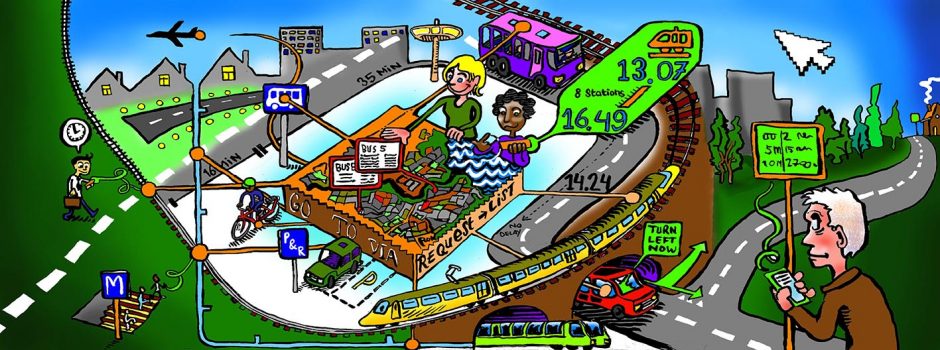Comparing gains and costs of projects for intelligent mobility show an alarming picture. Many million euros have been spent without a clear sight of a pay-out. Moreover, it proves really hard to assess the gains of these projects.
key words: cost-benefit analysis, logic of consequences, logic of appropriateness, funding innovation
What happens if we try to draw up the balance sheet right here and now? Do these platforms actually improve society? Do the gains outweigh the costs, as envisioned? And by the way, whose gains and whose costs? When are we able to sift the wheat from the chaff? When do we know if we arrived in the promised land or created bulky public money eating machines instead?
First the costs. The costs of innovation are relatively concrete. If we only look at the EU funded projects focused on data platforms or frameworks for intelligent mobility in the past five years, this easily adds up to an investment of more than 100 million, the bulk of which is subsidy. These projects are for example SuperHub, MyWay, Petra, Modum, Sunset, Ecompass, Reduction, Peacox, MoveSmart, MoveUs, Hope, Team, Instant Mobility, Tide, Direct, WiseTrip, Enhanced WiseTrip, EUtravel, Bonvoyage, I-tour and Catch.
Then the gains. We assume that the main gain of intelligent mobility platforms lies in ‘being well-informed’. Among our interviewees, there is strong consensus about the potential gains being huge. A slight change in mobility patterns, for example a few percent less cars, indeed, may be worth many millions in terms of prevented costs, health risks and environmental damage on a yearly basis. However, we should multiply its value with the frequency of use. If platforms – either developed by EU funding or not – are not being used, if there is nothing to multiply with, the actual value might be a trillion times zero users, and remain zero.
Still, if we assume that the platforms will be used, the value remains difficult to estimate, for at least four major reasons. First, being well-informed consists of a great many facets, some subjective, others contested, and it may differ a lot per person and per region. Second, its perceived value changes over time. Third, the current quality of travel information, the benchmark in this matter, also widely differs between European cities, and even more so in the rest of the world. For some cities we visited, the available travel information already exceeded the ambitions of certain platforms in the making. But we also found transport companies involved in the process of building a fancy multi-modal platform and an app for intelligent mobility, whereas they somehow could not even print out a single static map for their daily customers to show all the lines and stops for a single transport mode. Fourth, the value of being well-informed also strongly diverges when we consider the actual goals and the actual users. Is it about the environment or the economy? Is it about individual profit or system stability? Is it meant to help business, travellers, planners, policy-makers or a mix of them? Given all these variables, estimating the value of being well-informed is quite a Herculean task.
There is a fifth more fundamental reason as well, that refers to the assumption that better information would lead in change of behaviour. This assumption – on its turn – is based on the idea that travellers, or any other mobility related stakeholder, actually make their choices on the basis of the best information about the consequences of their traveling. But do they? In other words, the traveller would have a ‘logic of consequences’. An Israeli interviewee openly doubted whether there is a market for multi-modal travel advice, because people getting into their car wouldn’t be intending to leave it halfway for public transport, at least in Israel. This would suggest that there is more than calculation of consequence. In a broader sense, when it would concern the risks of smoking, for example, being well-informed may prove ineffective for addicted smokers. Being well-informed about CO2-emissions may face a similar fate. Not only because people may not prioritize sustainability, but also because their daily decision-making may just as well be based on identity, cultural patterns and what people deem appropriate on a routine basis, instead of rationally weighing pros and cons. In other words: to behave according to a ‘logic of appropriateness’ instead of a ‘logic of consequences’. If the ‘logic of appropriateness’ is valid, and there is much reason to believe it is to a considerable extent, this would seriously affect the gains of better travel information.
If we draw up the balance sheet now for a group of EU projects, more than a hundred million have been spent in a few years to produce many more or less similar platforms and frameworks with often little users for the present, if any, and accordingly without a clear sight of a proportional pay out for users. This is not surprising per se and perhaps not even as alarming as it seems. We are dealing with a large-scale innovation process. The costs precede the gains. But if this is not the right moment to see the gains, when is?
